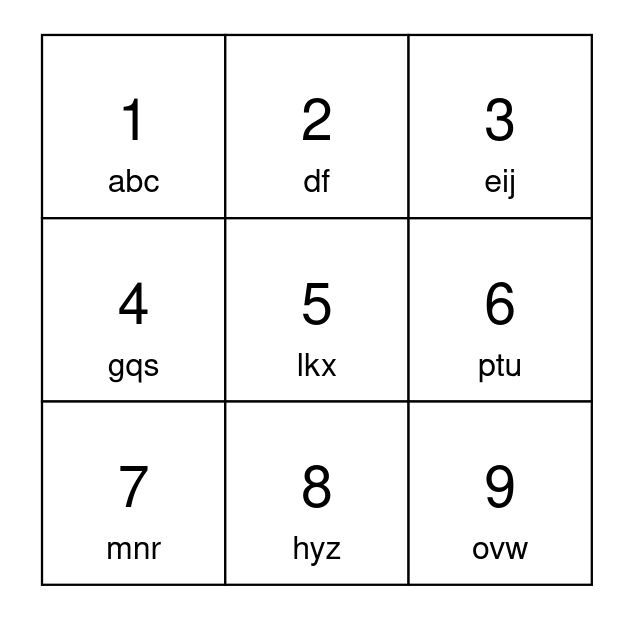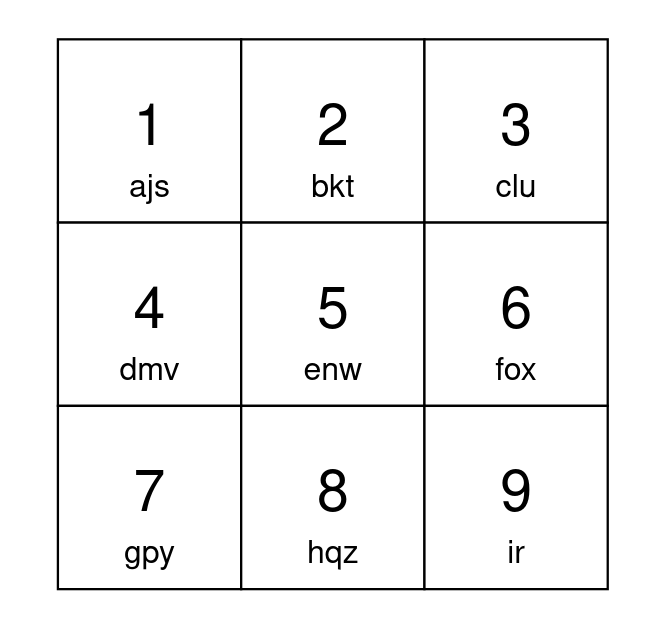Minimum Number of Keypresses
MediumUpdated: Jul 26, 2025
Practice on:
Problem
You have a keypad with 9 buttons, numbered from 1 to 9, each mapped to lowercase English letters. You can choose which characters each button is matched to as long as:
- All 26 lowercase English letters are mapped to.
- Each character is mapped to by exactly
1button. - Each button maps to at most
3characters.
To type the first character matched to a button, you press the button once. To type the second character, you press the button twice, and so on.
Given a string s, return _theminimum number of keypresses needed to type _s using your keypad.
Note that the characters mapped to by each button, and the order they are mapped in cannot be changed.
Examples
 Example 1:
Example 1:
Input: s = "apple"
Output: 5
Explanation: One optimal way to setup your keypad is shown above.
Type 'a' by pressing button 1 once.
Type 'p' by pressing button 6 once.
Type 'p' by pressing button 6 once.
Type 'l' by pressing button 5 once.
Type 'e' by pressing button 3 once.
A total of 5 button presses are needed, so return 5.
Example 2:

Input: s = "abcdefghijkl"
Output: 15
Explanation: One optimal way to setup your keypad is shown above.
The letters 'a' to 'i' can each be typed by pressing a button once.
Type 'j' by pressing button 1 twice.
Type 'k' by pressing button 2 twice.
Type 'l' by pressing button 3 twice.
A total of 15 button presses are needed, so return 15.
Constraints:
1 <= s.length <= 10^5sconsists of lowercase English letters.
Solution
Method 1 – Greedy Frequency Assignment
Intuition
Assign the most frequent letters to the first position of each button, next most frequent to the second, and so on. This minimizes total keypresses.
Approach
- Count frequency of each letter in s.
- Sort frequencies descending.
- For the top 9, each press costs 1; next 9 cost 2; last 8 cost 3.
- Sum up total keypresses.
Code
C++
#include <string>
#include <vector>
#include <algorithm>
using namespace std;
class Solution {
public:
int minimumKeypresses(string s) {
vector<int> freq(26, 0);
for (char c : s) freq[c-'a']++;
sort(freq.rbegin(), freq.rend());
int ans = 0;
for (int i = 0; i < 26; ++i) {
ans += freq[i] * (i/9 + 1);
}
return ans;
}
};
Go
func minimumKeypresses(s string) int {
freq := make([]int, 26)
for _, c := range s { freq[c-'a']++ }
sort.Slice(freq, func(i, j int) bool { return freq[i] > freq[j] })
ans := 0
for i := 0; i < 26; i++ {
ans += freq[i] * (i/9 + 1)
}
return ans
}
Java
import java.util.*;
class Solution {
public int minimumKeypresses(String s) {
int[] freq = new int[26];
for (char c : s.toCharArray()) freq[c-'a']++;
Arrays.sort(freq);
int ans = 0;
for (int i = 0; i < 26; ++i) {
ans += freq[25-i] * (i/9 + 1);
}
return ans;
}
}
Kotlin
class Solution {
fun minimumKeypresses(s: String): Int {
val freq = IntArray(26)
for (c in s) freq[c-'a']++
freq.sortDescending()
var ans = 0
for (i in 0 until 26) {
ans += freq[i] * (i/9 + 1)
}
return ans
}
}
Python
class Solution:
def minimumKeypresses(self, s: str) -> int:
from collections import Counter
freq = sorted(Counter(s).values(), reverse=True)
freq += [0] * (26 - len(freq))
return sum(freq[i] * (i//9 + 1) for i in range(26))
Rust
impl Solution {
pub fn minimum_keypresses(s: String) -> i32 {
let mut freq = vec![0; 26];
for c in s.chars() { freq[c as usize - 'a' as usize] += 1; }
freq.sort_by(|a, b| b.cmp(a));
let mut ans = 0;
for i in 0..26 { ans += freq[i] * (i/9 + 1); }
ans
}
}
TypeScript
class Solution {
minimumKeypresses(s: string): number {
const freq = Array(26).fill(0);
for (const c of s) freq[c.charCodeAt(0) - 97]++;
freq.sort((a, b) => b - a);
let ans = 0;
for (let i = 0; i < 26; ++i) ans += freq[i] * (Math.floor(i/9) + 1);
return ans;
}
}
Complexity
- ⏰ Time complexity:
O(n + 26 log 26)— n = length of s. - 🧺 Space complexity:
O(1)— only 26 counters.